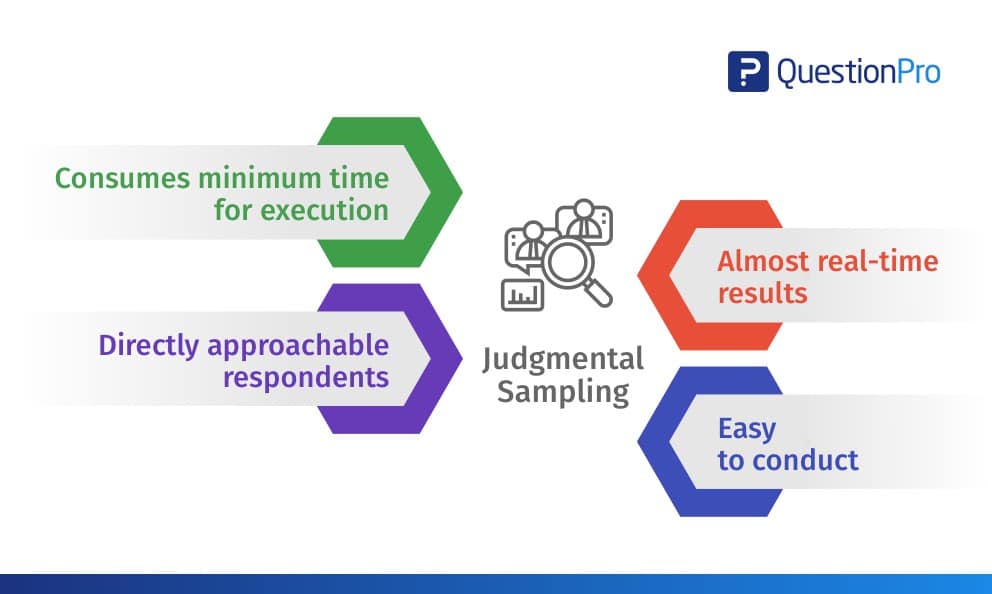 Reading Time: 3 minutes read
Reading Time: 3 minutes readJudgmental Sampling Definition
Judgmental sampling, also called purposive sampling or authoritative sampling, is a non-probability sampling technique in which the sample members are chosen only on the basis of the researcher’s knowledge and judgment. As the researcher’s knowledge is instrumental in creating a sample in this sampling technique, there are chances that the results obtained will be highly accurate with a minimum margin of error.
The process of selecting a sample using judgmental sampling involves the researchers carefully picking and choosing each individual to be a part of the sample. The researcher’s knowledge is primary in this sampling process as the members of the sample are not randomly chosen.
When to execute Judgmental Sampling?
Judgmental sampling is most effective in situations where there are only a restricted number of people in a population who own qualities that a researcher expects from the target population. Researchers prefer to implement Judgmental sampling when they feel that other sampling techniques will consume more time and that they have confidence in their knowledge to select a sample for conducting research.
Judgmental or Expert sampling is usually used in situations where the target population comprises of highly intellectual individuals who cannot be chosen by using any other probability or non-probability sampling technique. It is also used in situations where the sample selected using other sampling methods need to be approved or filtered. For instance, in situations where a researcher conducts convenience sampling to gather feedback from professors about their university but the fact that there are high chances of the results to be skewed, researchers prefer judgmental sampling to select those professors who will provide 100% feedback about the university.
LEARN ABOUT: Sampling Frame
Selecting each individual of the sample is a critical challenge that an intellectual researcher will undertake. It is a tedious task to handpick members of a sample while ensuring there is no bias involved.
The authority involved in the selection process may not necessarily be “experts” in the field but they have to comply with certain characteristics expected from a Judgmental sampling authority and sampling errors. Education or work experience is not considered while appointing authorities for the selection process.
Purposive sampling is used where there is time-constraint for sample creation and the authorities involved would prefer relying on their knowledge and not on other sampling methods. But, one must keep in mind, the fact that a researcher may or may not have the appropriate proficiency to conduct an effective sampling process. This is the only disadvantage of purposive sampling. Each researcher who takes up the responsibility of creating a sample using expert sampling will have to be extremely confident in their own skills and understanding of the subject.
LEARN ABOUT: Survey Sampling
Examples of Judgmental Sampling
Here are two distinct Judgmental Sampling examples:
- Consider a scenario where a panel decides to understand what are the factors which lead a person to select ethical hacking as a profession. Ethical hacking is a skill which has been recently attracting youth. More and more people are selecting it as a profession. The researchers who understand what ethical hacking is will be able to decide who should form the sample to learn about it as a profession. That is when judgmental sampling is implemented. Researchers can easily filter out those participants who can be eligible to be a part of the research sample.
- There are many tribes in the world which have their own religious beliefs, for instance, the Balinese people follow syncretism, which is considered to be a mixture of Hinduism and Buddhism. For researchers who plan to study the culture of Southeast Asian countries, it is advised that they select strata using judgmental sampling as religious beliefs are considered to be highly sensitive in this part of the world. Due to the sensitivity of the topic, if samples of those who have appropriate knowledge are created and research is conducted with those samples, results will be highly accurate. Probability sampling techniques often produce altered results in such cases.
Judgmental Sampling Advantages
- Consumes minimum time for execution: In this sampling bias approach, researcher expertise is important and there are no other barriers involved due to which selecting a sample becomes extremely convenient.
- Allows researchers to approach their target market directly: There are no criteria involved in selecting a sample except for the researcher’s preferences. Due to this, he/she can communicate directly with the target audience of their choice and produce desired results.
- Almost real-time results: A quick poll or survey can be conducted with the sample using judgmental sampling since the members of the sample will possess appropriate knowledge and understanding of the subject.
Read more about:




















